
Tiny Home Regulations in New Jersey: The Complete Guide
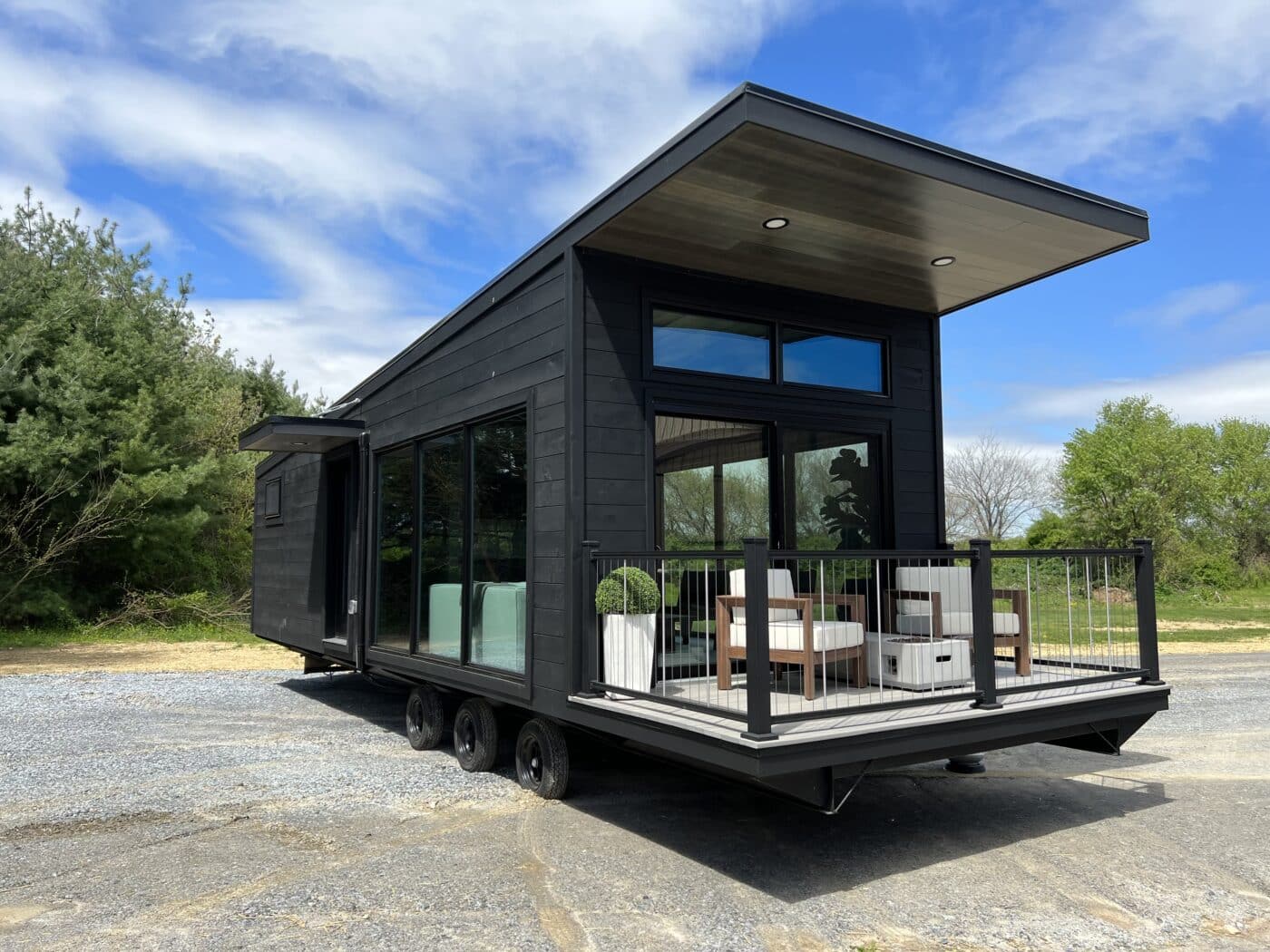
If you’re a New Jersey resident planning to buy a tiny house, it’s crucial to understand the entire process before making your purchase. As a manufacturer of tiny houses, we are here to guide you through every step and ensure you’re well-informed about all aspects of tiny homes in New Jersey.
This article will provide you with the essential information you need to make a confident and informed decision.
Are Park Models and tiny homes the same thing?
Yes. Park models and tiny homes are the same thing; more specifically, all the park models that we build at Zook Cabins are THOWs. However, another common certification for tiny homes is NOAH. to learn the difference between the two take a look at our RVIA VS NOAH Tiny Home blog.
What Counties in New Jersey Allow Tiny Homes?
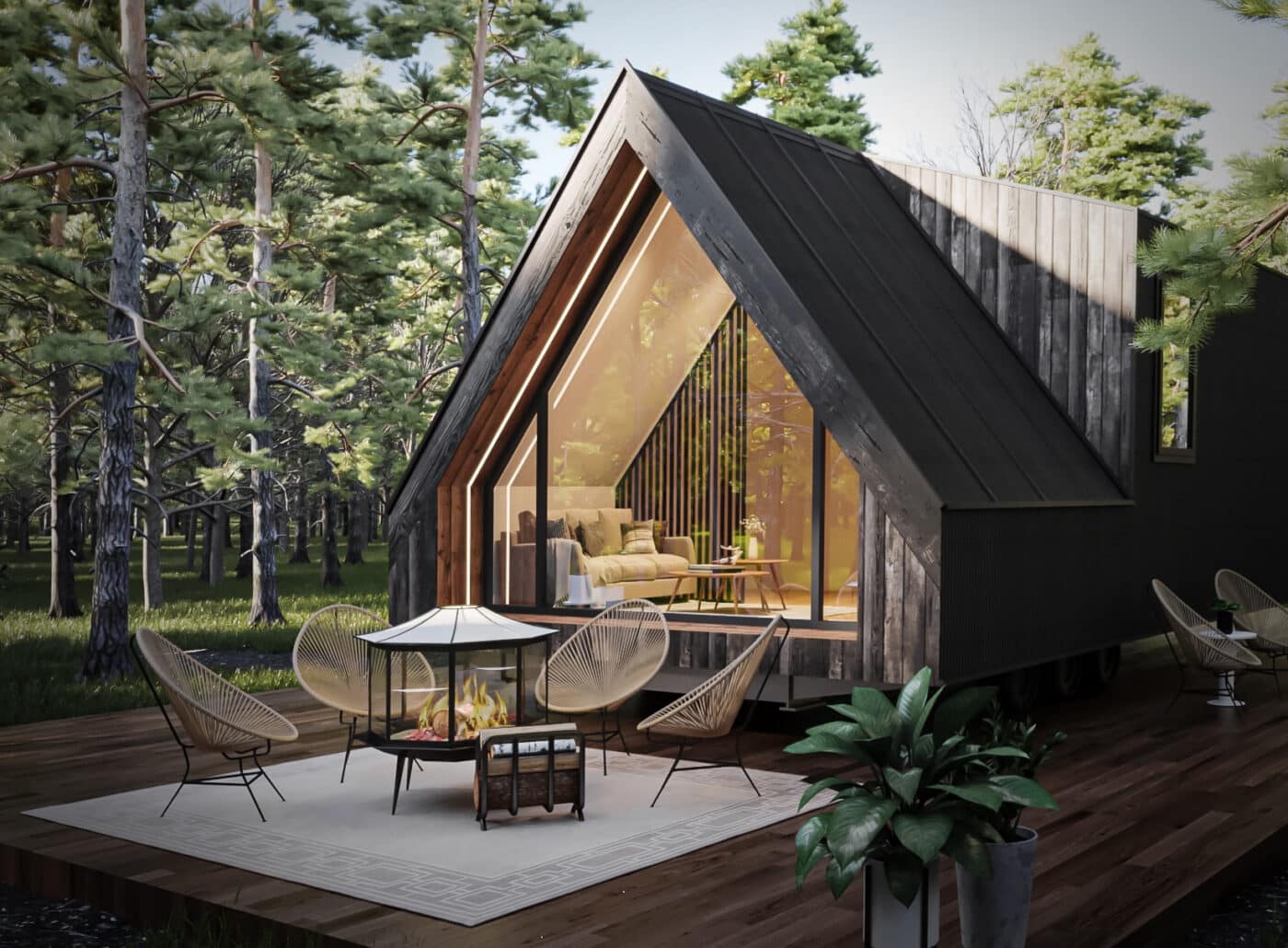
New Jersey is generally considered a friendly state towards tiny houses, aligning with the International Residential Code like many other states in the US. However, it’s important to note that regulations for tiny house zoning and construction can vary significantly from one county or city towith in the state of NJ.
Find Your Tiny Home Regulations in New Jersey by County
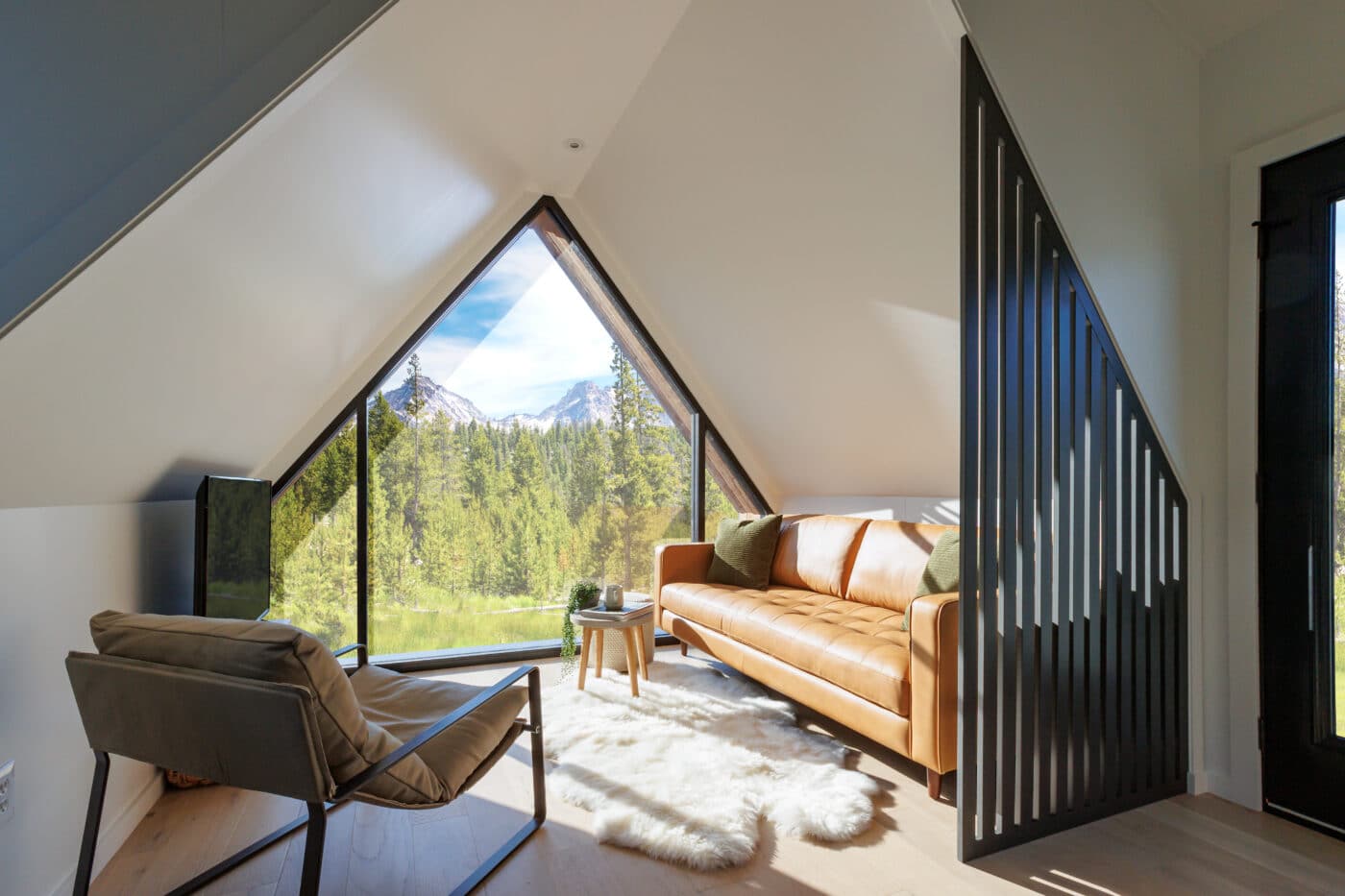
| Atlantic County | https://ecode360.com/15218115#15218116 |
| Bergen County | https://www.co.bergen.nj.us/ |
| Burlington County | https://co.burlington.nj.us/1230/Permits-Licenses-Inspections |
| Camden County | https://www.camdencounty.com/ |
| Cape May County | https://www.capemaycountynj.gov/ |
| Cumberland County | https://www.cumberlandcountynj.gov/ |
| Essex County | https://essexcountynj.org/ |
| Gloucester County | https://gloucestercountynj.gov/ |
| Hudson County | https://www.hcnj.us/ |
| Hunterdon County | https://www.co.hunterdon.nj.us/ |
| Mercer County | https://www.mercercounty.org/ |
| Middlesex County | https://www.middlesexcountynj.gov/ |
| Monmouth County | http://visitmonmouth.com/ |
| Morris County | https://www.morriscountynj.gov/Home |
| Ocean County | https://www.co.ocean.nj.us/ |
| Passaic County | https://www.passaiccountynj.org/ |
| Salem County | https://www.salemcountynj.gov/ |
| Somerset County | https://www.co.somerset.nj.us/ |
| Sussex County | https://www.sussex.nj.us/ |
| Union County | https://ucnj.org/ |
| Warren County | https://www.warrencountynj.gov/ |
Does Atlantic County, NJ, Allow Tiny Houses?
Yes.
However, In Atlantic County, NJ, the regulations regarding tiny houses can vary significantly depending on the specific municipality within the county.
Does Bergen County, NJ Allow Tiny Houses?
Yes.
Bergen County, NJ, like many areas, has specific zoning and building regulations that can affect whether a tiny house is allowed in certain areas.
Does Burlington County, NJ, Allow Tiny Houses?
Yes, but the regulations and allowances for tiny houses in Burlington County, NJ, can vary depending on the specific municipality within the county.
Generally, tiny houses face a variety of zoning, building code, and land use regulations that can affect their legality and placement.
Does Camden County, NJ Allow Tiny Houses?
Yes, like many areas in New Jersey, Camden County may require special permits and adherence to specific construction standards for tiny houses.
Some municipalities in New Jersey permit tiny houses as accessory dwelling units (ADUs) on properties with an existing primary residence.
However, it is crucial to verify with local authorities whether this is allowed in Camden County.
Does Cape May County, NJ Allow Tiny Houses?
Yes, In Cape May, tiny homes can be built on properties, but they must comply with local zoning regulations, which may vary by municipality.
Some areas permit tiny homes as accessory dwelling units (ADUs), but it is essential to verify this with local authorities before proceeding.
Cape May is noted as one of the popular locations in New Jersey for tiny homes due to its scenic views and proximity to the beach.
Does Cumberland County, NJ Allow Tiny Houses?
In Cumberland County, tiny houses may be permitted as accessory dwelling units (ADUs) on properties with an existing primary residence.
It is essential to check with local zoning and planning authorities to confirm the specific requirements and obtain any necessary permits.
Does Essex County, NJ Allow Tiny Houses?
Yes, like many areas, Essex County, NJ, has specific zoning regulations that dictate whether tiny houses are allowed and under what conditions.
The zoning department of the specific town or city within Essex County where you’re interested in placing a tiny house can provide the most accurate and up-to-date information on zoning ordinances and whether they permit tiny houses.
Does Gloucester County, NJ Allow Tiny Houses?
Gloucester County, NJ, does not have specific county-wide regulations regarding tiny houses. This makes this part of the state somewhat confusing about what can and can not be allowed with a tiny home.
However, if you contact your local municipal office, they will be able to give you specific guidance on what is and is not allowed.
Does Hudson County, NJ, Allow Tiny Houses?
Yes, it does. The best way to confirm is by contacting the local zoning or planning department of the specific town or city within Hudson County where you’re interested in placing a tiny house.
Does Hunterdon County, NJ Allow Tiny Houses?
Yes, Hunterdon County, NJ allows tiny houses, although they do not have specific county-wide regulations in place for them. It’s recommended to contact the local town or city authorities to obtain detailed information regarding tiny houses in that area.
Does Mercer County, NJ Allow Tiny Houses?
Mercer County, NJ, like many regions, adheres to state and local zoning laws concerning tiny houses. These regulations often vary based on whether the tiny house is classified as a permanent residence, an accessory dwelling unit (ADU), or a temporary structure.
For accurate guidance, it’s advisable to contact the Mercer County Planning Department or the local municipal zoning office where you plan to locate the tiny house. They can provide specific details on zoning ordinances, minimum square footage requirements, utility connections, and other applicable regulations.
Does Monmouth County, NJ Allow Tiny Houses?
These regulations can vary depending on the township or municipality within Monmouth County. Typically, tiny houses may face challenges due to minimum square footage requirements for residential structures and zoning laws that dictate the type of dwellings allowed in certain areas.
Does Ocean County, NJ, Allow Tiny Houses?
Yes, Ocean County, NJ, does have regulations regarding tiny houses. To find out the specific regulations for tiny houses in Ocean County, NJ, it’s best to contact the local zoning or planning department.
Regulations can vary depending on the municipality within Ocean County. Getting in touch with them will provide information on zoning ordinances, building codes, and any restrictions that may apply to tiny houses in different areas of the county.
Does Passaic County, NJ, Allow Tiny Houses?
Yes, Passaic County, NJ, allows tiny houses and has regulations governing their construction and placement.
These regulations typically cover zoning ordinances, building codes, and specific conditions such as maximum size requirements and whether a foundation is necessary.
For detailed information on these regulations, it is recommended to contact the Passaic County zoning or planning department directly. They can provide accurate details on requirements and any restrictions that apply to tiny houses within the county.
Does Salem County, NJ Allow Tiny Houses?
Yes, Salem County allows tiny houses, and regulations typically include zoning ordinances, building codes, and specific conditions that may vary depending on the municipality.
If you are planning to have a tiny house in Salem County, it is recommended to contact the local authorities to get detailed information about the regulations and the process involved.
Does Somerset County, NJ Allow Tiny Houses?
Yes, Somerset County, NJ, allows tiny houses, but there are specific regulations and zoning ordinances that need to be followed.
Each municipality within the county may have its own rules and requirements regarding the construction and placement of tiny houses. It is essential to check with the local zoning office or planning department of the specific town or city within Somerset County to understand the regulations that apply.
Does Sussex County, NJ Allow Tiny Houses?
Yes, In Sussex County, NJ, the regulations for tiny houses depend on whether they are on a foundation or wheels.
Tiny houses on a foundation are generally allowed and must comply with local zoning laws, building codes, and the state’s Uniform Construction Code, which includes standards from the International Residential Code’s Appendix Q. These regulations cover minimum ceiling heights, emergency exits, and safety features.
Does Union County, NJ, Allow Tiny Houses?
Yes, Union County, NJ, allows tiny houses. Like any other county in NJ, Union County permits tiny houses as long as they follow building codes and zoning regulations.
It’s essential to check with local government officials in Union County for specific permits and zoning regulations before building or placing a tiny house on your property.
Does Warren County, NJ Allow Tiny Houses?
Yes, Warren County, NJ, allows tiny houses, provided they comply with building codes and zoning regulations.
Generally, in New Jersey, tiny houses are considered a type of accessory dwelling unit (ADU) and must comply with the state’s Uniform Construction Code as well as local zoning laws. This typically means tiny houses need to be built on a permanent foundation and meet minimum square footage requirements
Find Your Tiny Home Regulations In NJ, By City
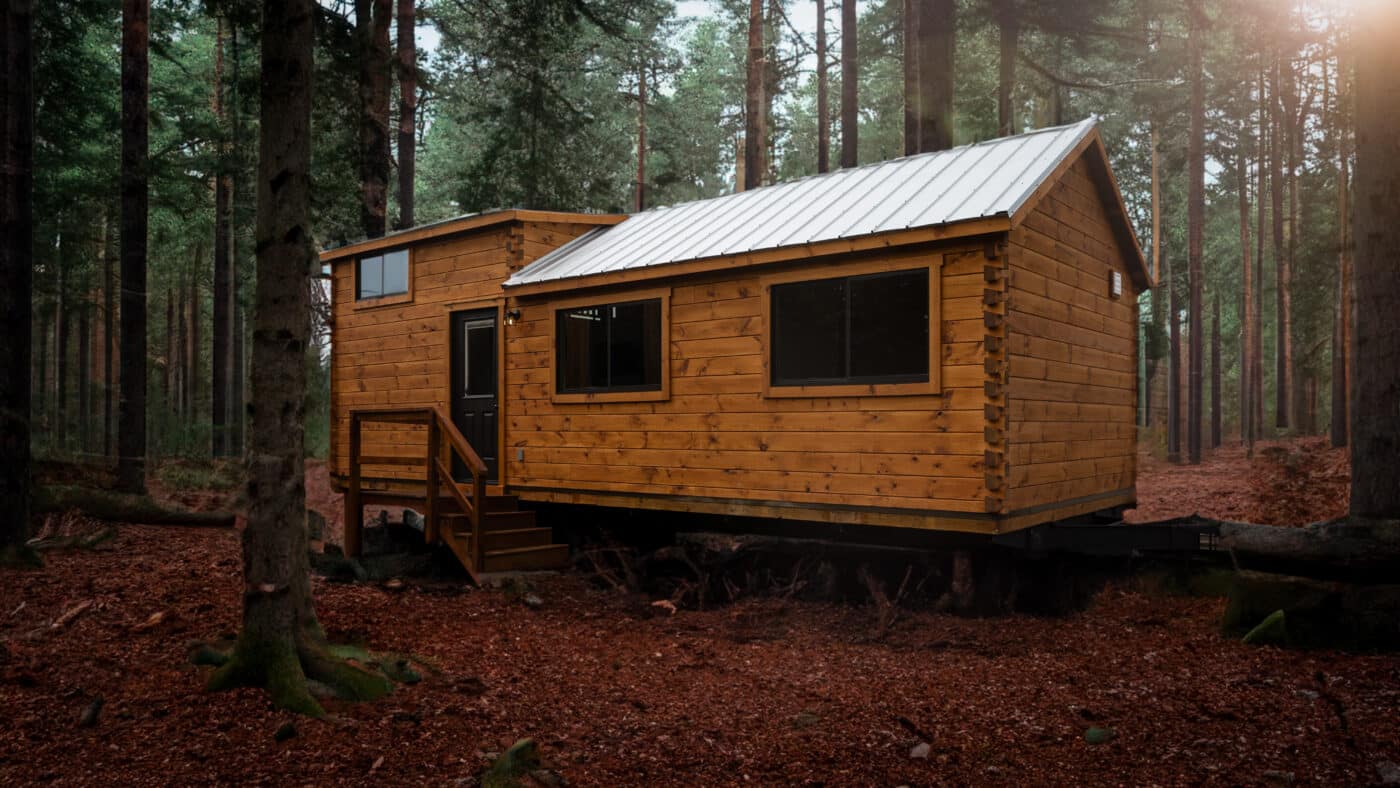
| Jersey City | https://www.jerseycitynj.gov/cityhall/HousingAndDevelopment/Zoning |
| Union City | https://www.ucnj.com/Departments/building-department |
| Atlantic City | https://www.acnj.gov/ |
| Neptune City | https://www.neptunecitynj.com/ |
| Ocean City | https://www.ococean.com/ |
Does Jersey City, NJ, Allow Tiny Homes?
Tiny houses are a bit complex in terms of regulations, especially in urban areas like Jersey City, NJ. Typically, zoning laws and building codes govern the placement and construction of tiny houses. In Jersey City, these regulations may include minimum square footage requirements for residences, setback requirements from property lines, and restrictions on accessory dwelling units (ADUs).
Does Union City, NJ, Allow Tiny Homes?
As of my last update, Union City, NJ, like many cities, has specific zoning and building codes that regulate housing types, including tiny homes. It’s advisable to check directly with the Union City zoning department or local municipality for the most current regulations and whether tiny homes are permitted, and if so, under what conditions (e.g., minimum size requirements, zoning districts where they are allowed).
Does Atlantic City, NJ, Allow Tiny Homes?
In Atlantic City, like many other New Jersey cities, zoning regulations can vary significantly between municipalities, with some potentially lacking specific provisions for tiny homes. It’s crucial to directly consult with the Atlantic City zoning office or municipality to fully grasp any local restrictions, requirements, or interpretations pertaining to tiny homes in the area.
Does Neptune City, NJ, Allow Tiny Homes?
The minimum size requirements for tiny houses can vary widely depending on local zoning regulations and building codes in Neptune City, NJ. Typically, municipalities set minimum size standards for habitable dwellings to ensure they meet health, safety, and livability standards.
Does Ocean City, NJ, Allow Tiny Homes?
Zoning regulations can vary widely between municipalities, and some may not have provisions that specifically address tiny homes. It’s important to check directly with the Ocean City zoning office or municipality to understand any local restrictions, requirements, or interpretations regarding tiny homes in the area.
What counties in New Jersey do not allow tiny homes?
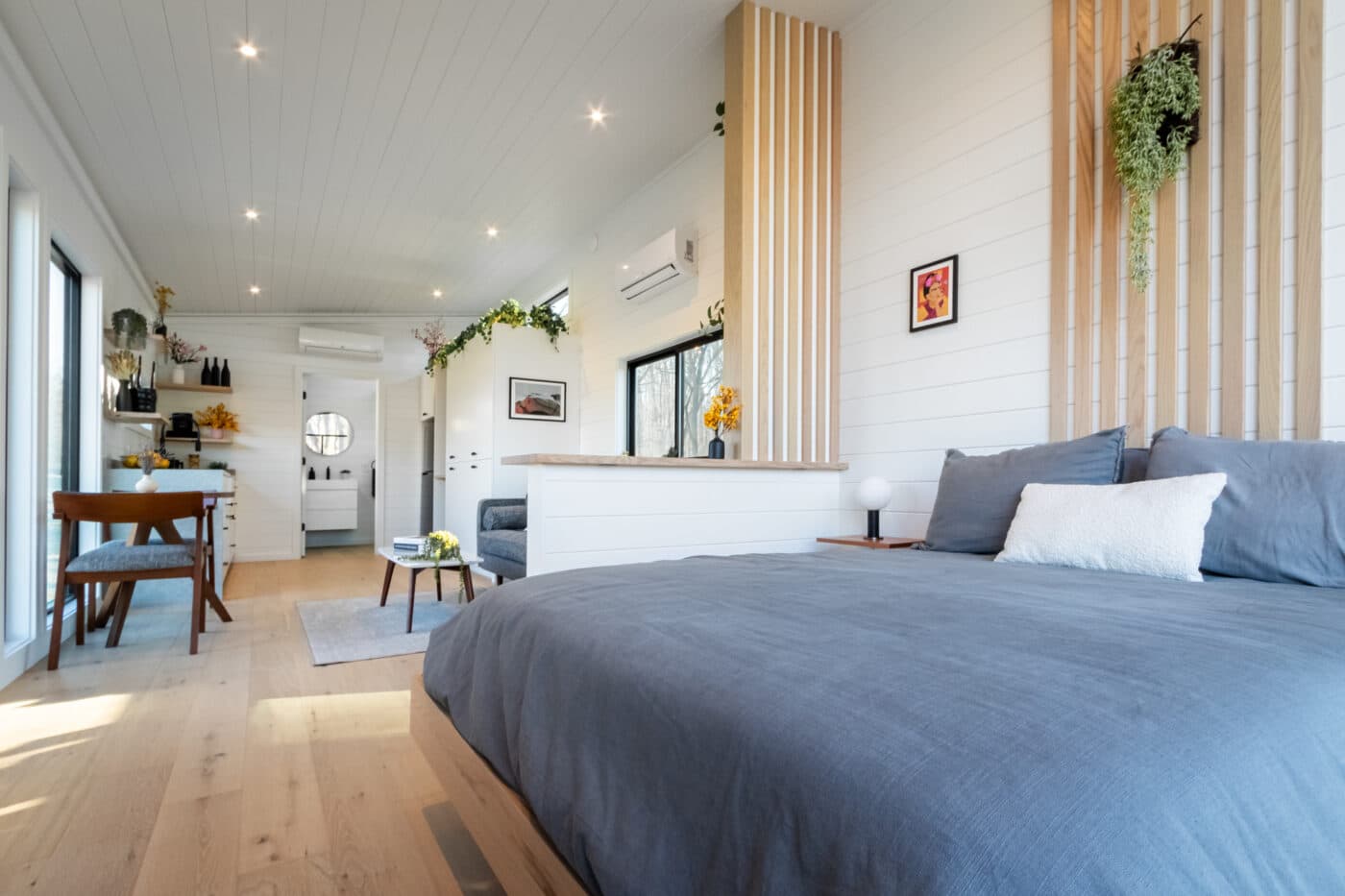
Many areas in NJ may not have specific provisions that address tiny homes, leading to a lack of clarity on their allowance. However, specific counties that are known to have more stringent zoning laws or building codes that might limit or prohibit tiny homes include:
- Bergen County
- Essex County
- Union County
- Hudson County
- Middlesex County
- Morris Coutny
These counties typically have more urban or suburban areas with stricter zoning and building regulations. However, it’s important to note that zoning laws can change and can also vary within different municipalities in the same county.
Cities/Towns That Don’t Allow Tiny Homes in NJ
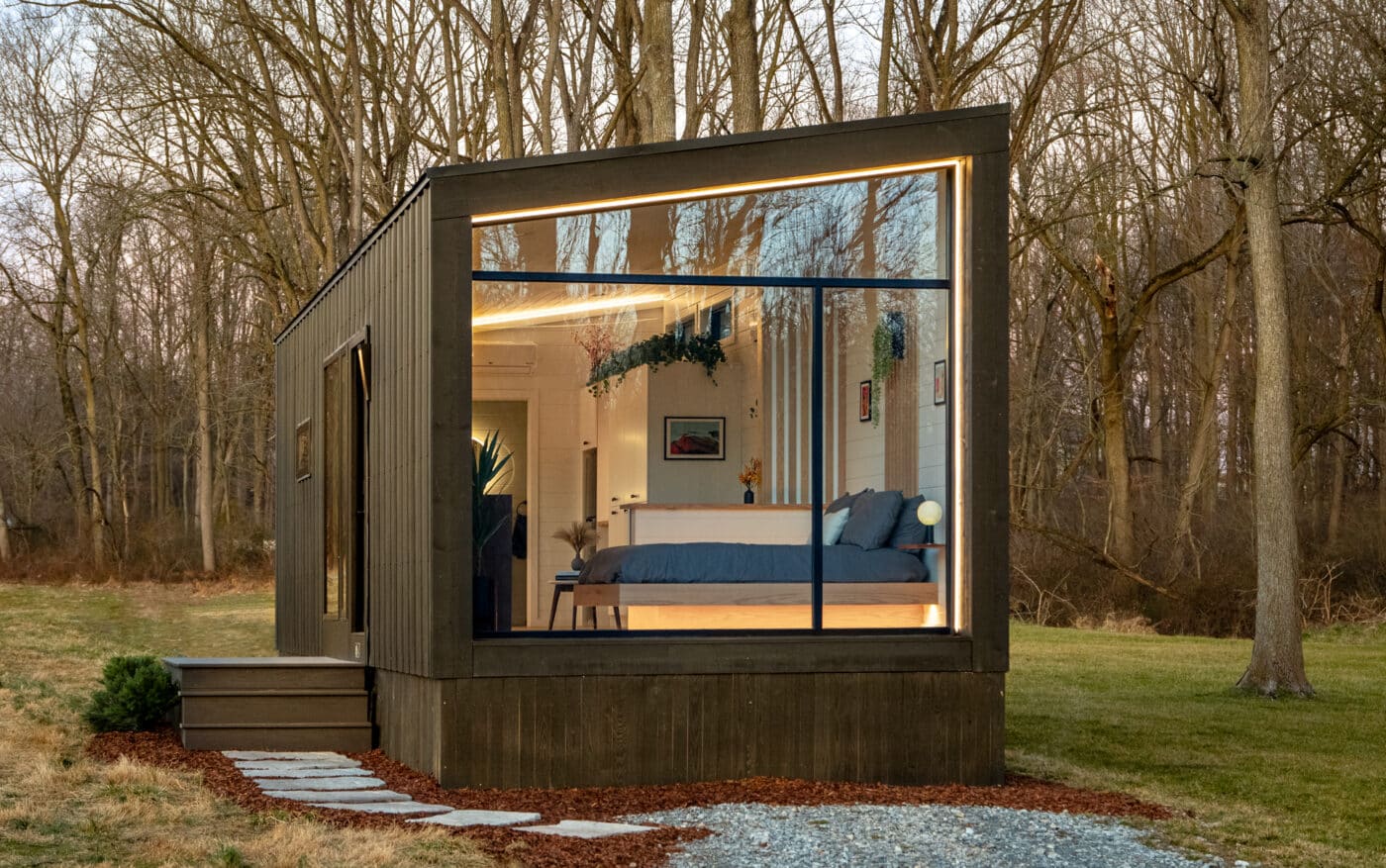
Finding specific cities and towns in New Jersey that don’t allow tiny homes is challenging because rules can vary, and not all places have outright bans. Instead, they may have strict zoning and building codes that make it hard to place tiny homes. Here are some cities and towns known for having tough regulations that might make it difficult to have tiny homes:
- Jersey City: Known for its dense urban environment and strict building codes.
- Hoboken: Highly urbanized with rigorous zoning laws.
- Newark: Large city with comprehensive zoning regulations.
- Paterson: Urban area with likely restrictive codes.
- Elizabeth: Dense population and strict zoning laws.
- Edison: Suburban area with stringent building codes.
- Princeton: Known for its strict zoning and building requirements.
- Montclair: Suburban area with comprehensive zoning regulations.
- Morristown: Has detailed zoning regulations that might restrict tiny homes.
- Summit: Suburban area with likely restrictive codes.
Tiny Homes That Are Allowed In NJ
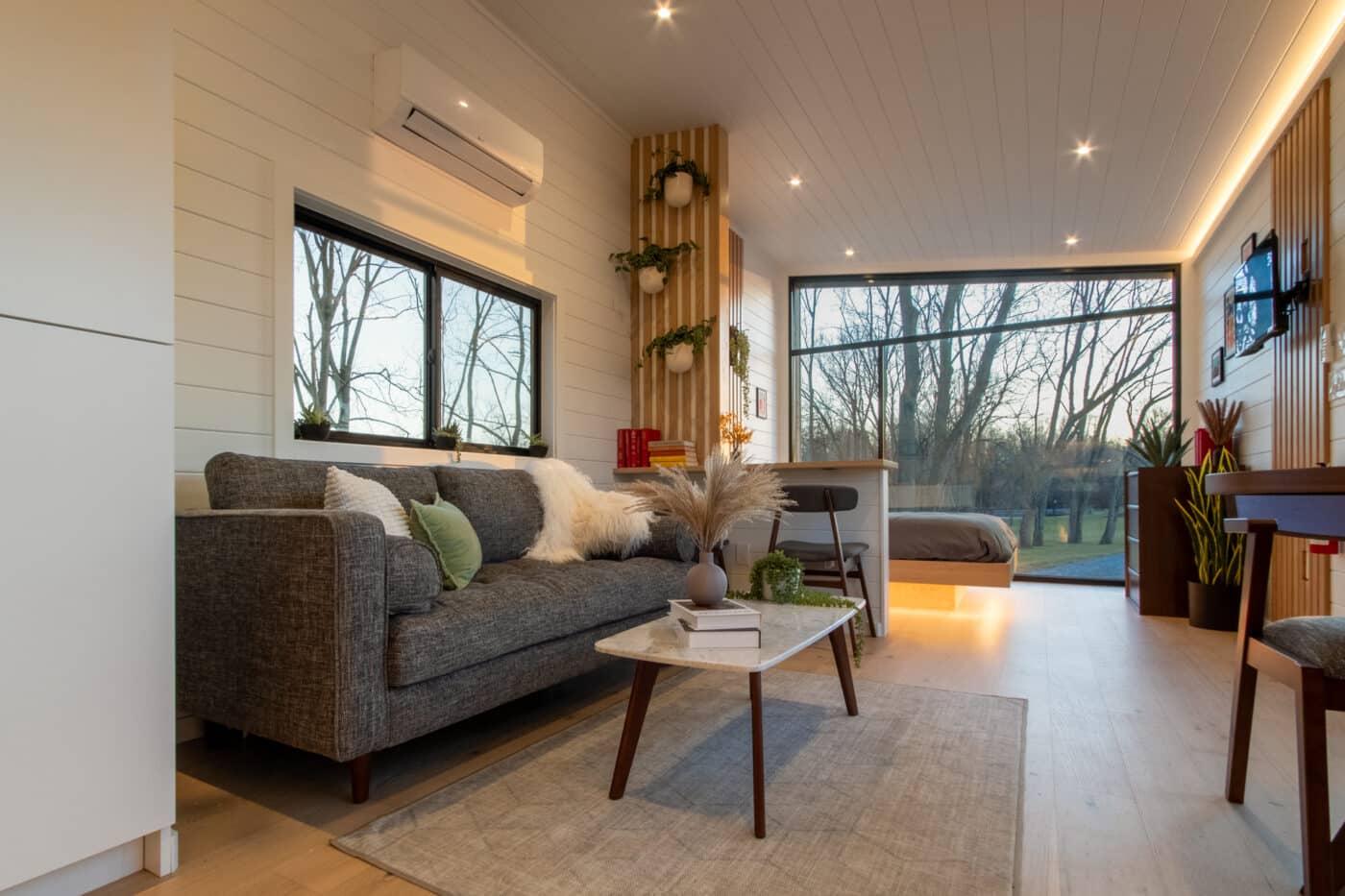
In New Jersey, the regulations for tiny homes vary significantly across municipalities due to local zoning and building codes. Here are some general guidelines and considerations for tiny homes in the state:
Tiny Homes on Wheels (THOWs)
Often classified as RVs, Tiny Homes on Wheels typically have limited placement options, such as RV parks, campgrounds, or designated zones for temporary residences. Using THOWs as permanent residences is more restricted.
Permanent Tiny Homes
Tiny homes built on a foundation and compliant with local building codes may be permitted in certain residential zones. These homes must meet the same safety, zoning, and utility standards as other residential structures.
Do You Need a Permit for a Tiny Home in NJ?
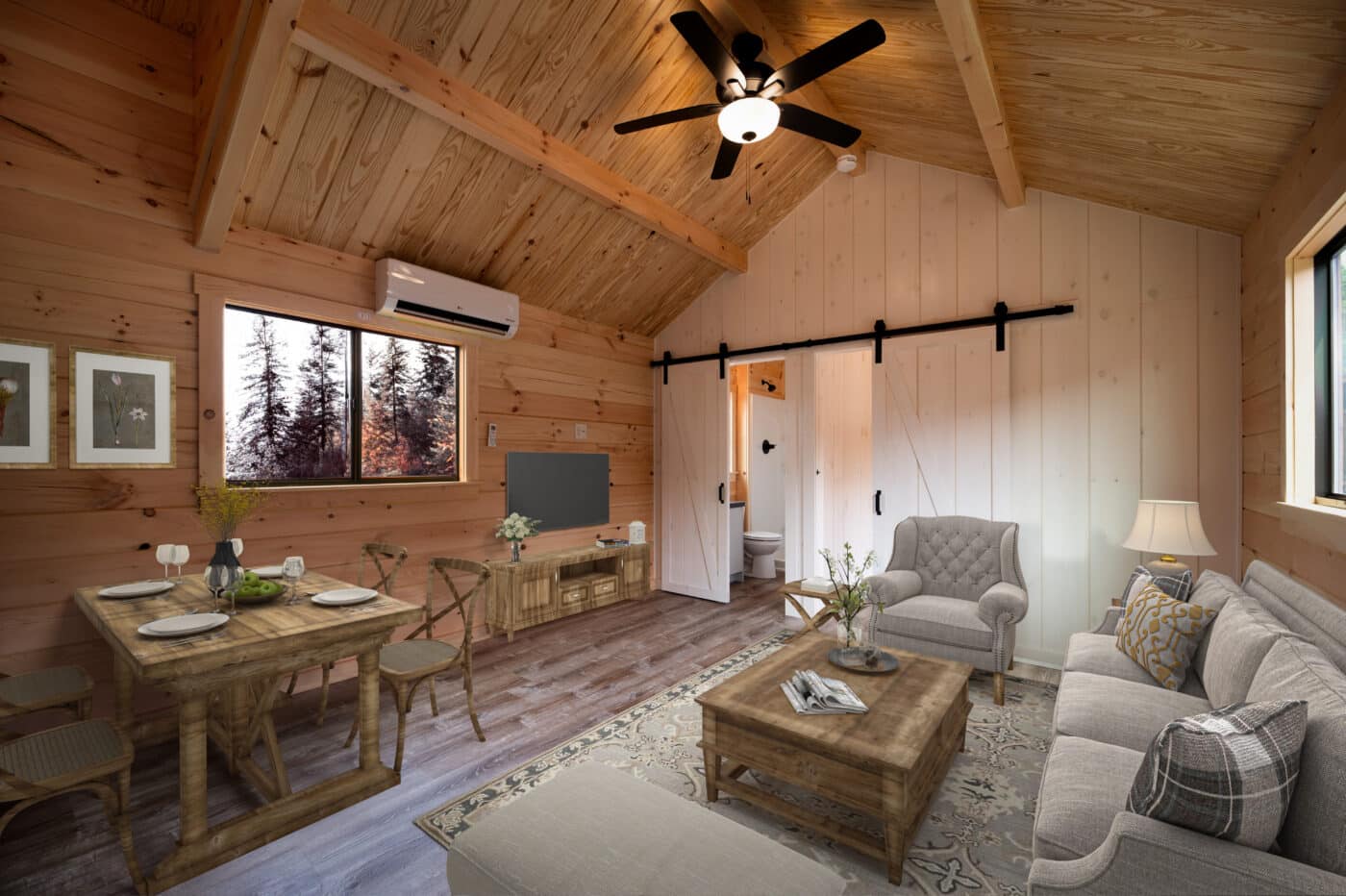
Yes, if you are a New Jersey resident looking to have a tiny house, whether as a permanent residence or a tiny house on wheels, you will need a permit.
New Jersey has adopted Appendix Q from the International Residential Code (IRC) as its minimum standard for tiny houses. Some standard regulations for tiny houses include:
- A ceiling height of not less than 6 feet 8 inches.
- Bathrooms, toilet rooms, and kitchens must have a ceiling height of at least 6 feet 4 inches.
Since regulations for tiny houses in New Jersey vary from county to county and city to city, it is essential to contact your local authorities to obtain specific details and ensure compliance. This will help you follow the rules and avoid any fines.
Are There Any Tiny Home Communities in NJ?
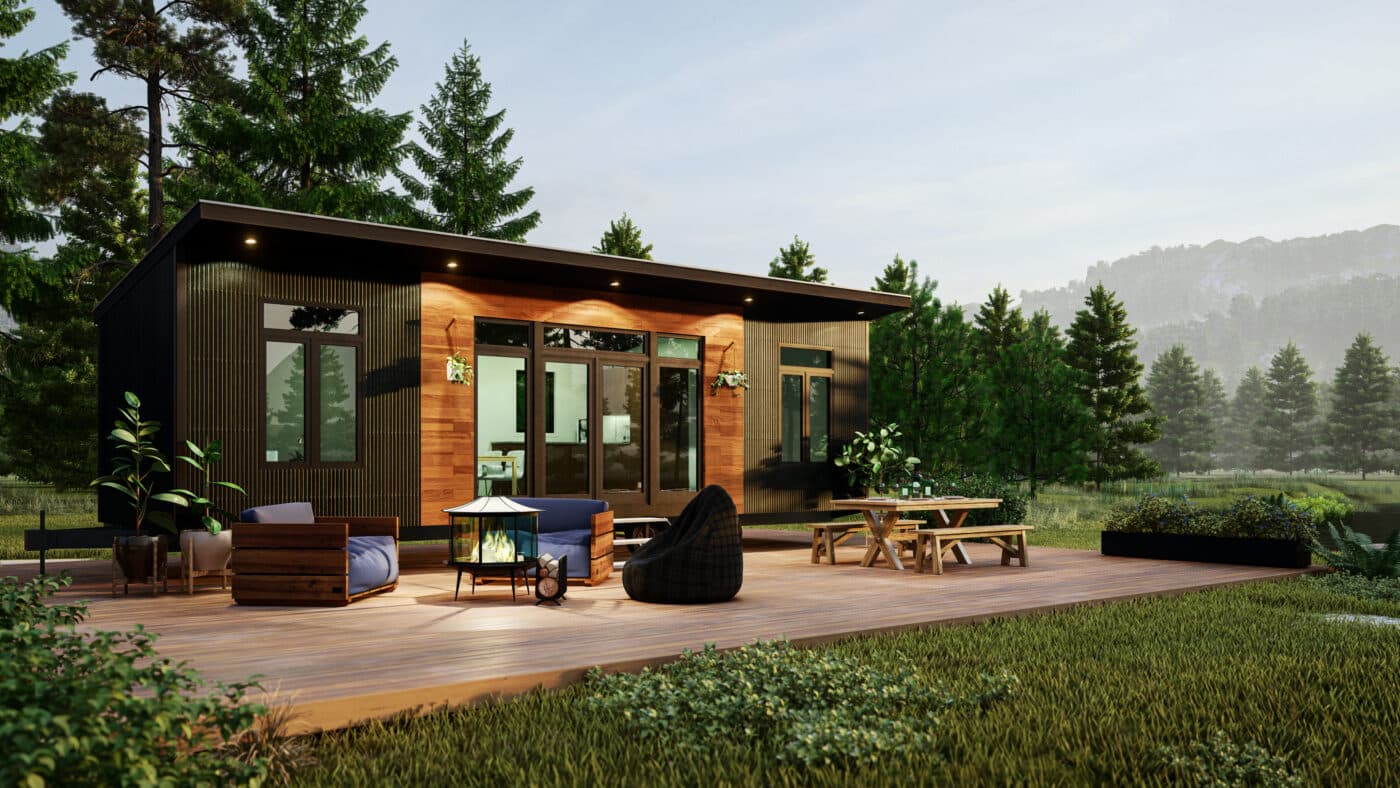
While tiny home communities are more common in some parts of the country, New Jersey has been slower to adopt this trend. However, there are some emerging options and communities where tiny homes are becoming more accepted.
Potential Tiny Home Communities in New Jersey
Jersey Shore Tiny Homes:
- This is a proposed community aiming to create affordable tiny homes at the Jersey Shore. They focus on sustainable living and are actively working on zoning approvals and community development.
Harmony Ridge Farm and Campground:
- Situated in Branchville, NJ, this campground offers sites that may be suitable for tiny homes on wheels. It provides a rustic setting with amenities for long-term stays.
Why Park Model Tiny Houses Are Booming in Popularity Across New Jersey and the U.S.
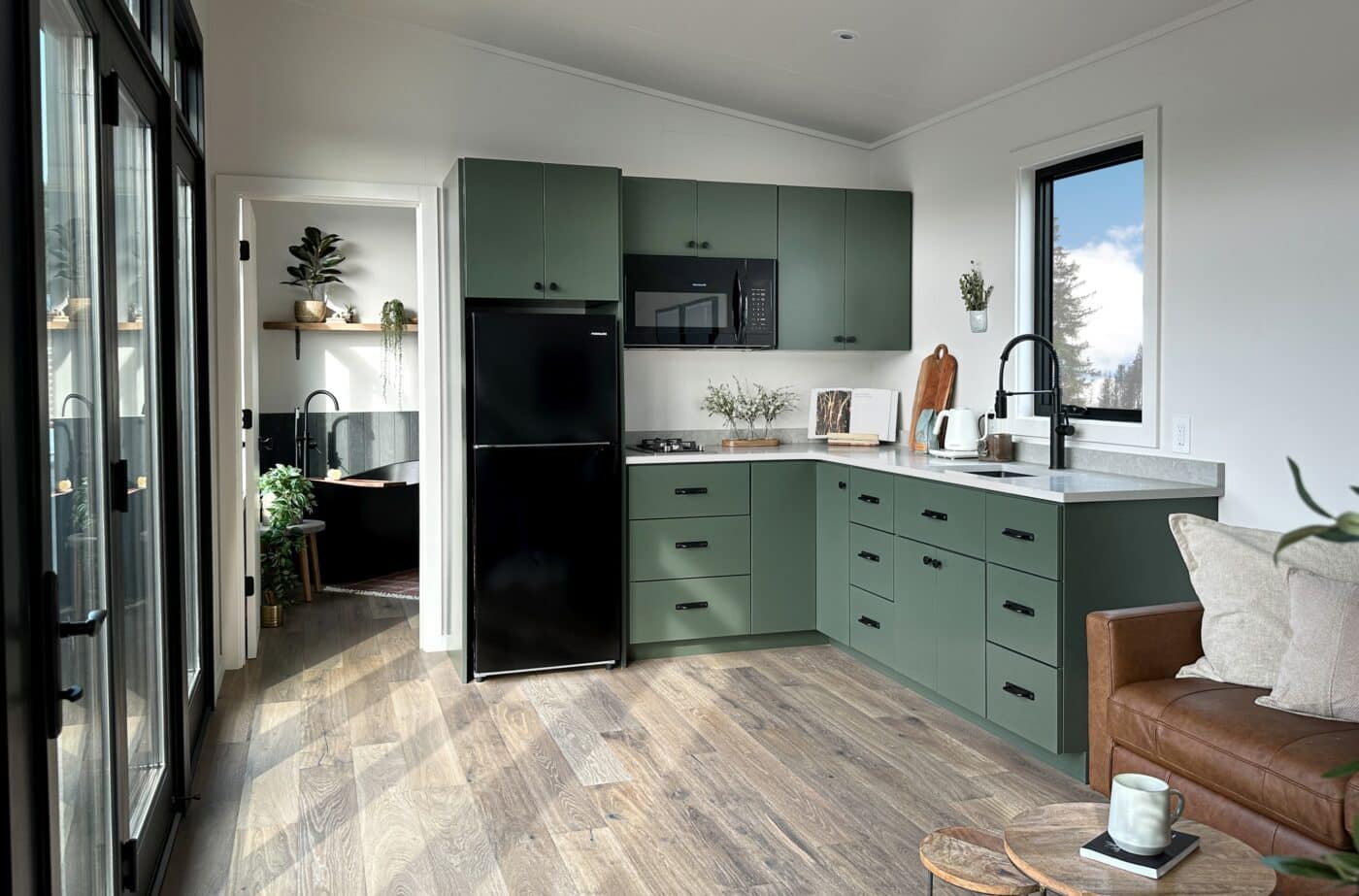
Park model tiny houses are becoming popular in New Jersey and the U.S. due to their affordability, flexibility, and sustainability. These homes offer a low-cost alternative to traditional housing, appeal to minimalists, and are often classified as RVs for easier placement. The rise of tiny home communities and updated zoning laws support this lifestyle. Eco-friendly, space-efficient, and customizable, they attract retirees, young professionals, and those seeking simplicity.
Here are some reasons to buy a park model tiny house:
- Mobility: Park model tiny homes offer the flexibility to move without the need for traditional real estate transactions.
- Design Flexibility: Park model tiny homes can be customized to meet individual preferences and needs, from layout to finishes.
- Vacation Homes: Park model tiny homes are often used as vacation homes or weekend getaways, offering a more affordable alternative to traditional vacation properties.
- Comfortable Living: Despite their small size, these homes can be designed to maximize comfort and functionality, often including modern amenities and high-quality finishes.
- RV Classification: Many park model tiny homes are classified as RVs, making them easier to place in RV parks and campgrounds, which are more widely accepted and have established infrastructures.
- Lower Maintenance: Smaller homes mean lower maintenance costs, both in terms of time and money.
Park Model Regulations in NJ
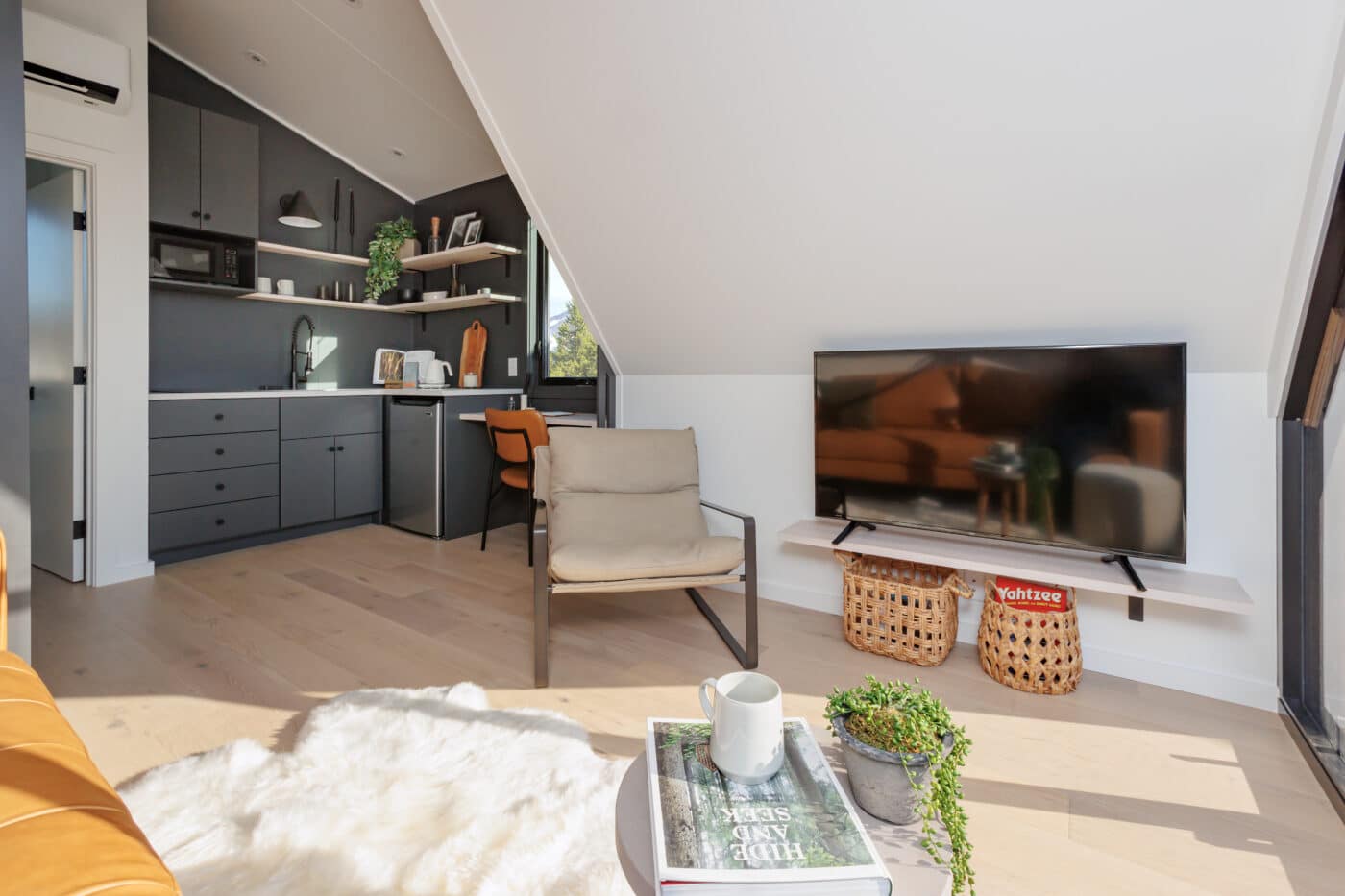
Park models are typically considered recreational vehicles (RVs) rather than permanent dwellings. This classification affects where they can be placed and used.
State Regulations:
Park models are generally governed by the New Jersey Department of Community Affairs (DCA), which oversees regulations for mobile and manufactured homes. They are typically subject to RV standards and may be restricted in terms of permanent residency.
Local Zoning Laws:
Specific municipalities may allow park models in RV parks, campgrounds, or specific zoning areas designated for temporary residences. Permanent use as a dwelling may have stricter requirements or limitations.
Placement and Use:
Check with local zoning authorities or RV parks directly to determine where park models are permitted and under what conditions. Each municipality may have its own rules regarding size, utilities, and length of stay.
Frequently Asked Questions About Tiny Home Regulations In NJ
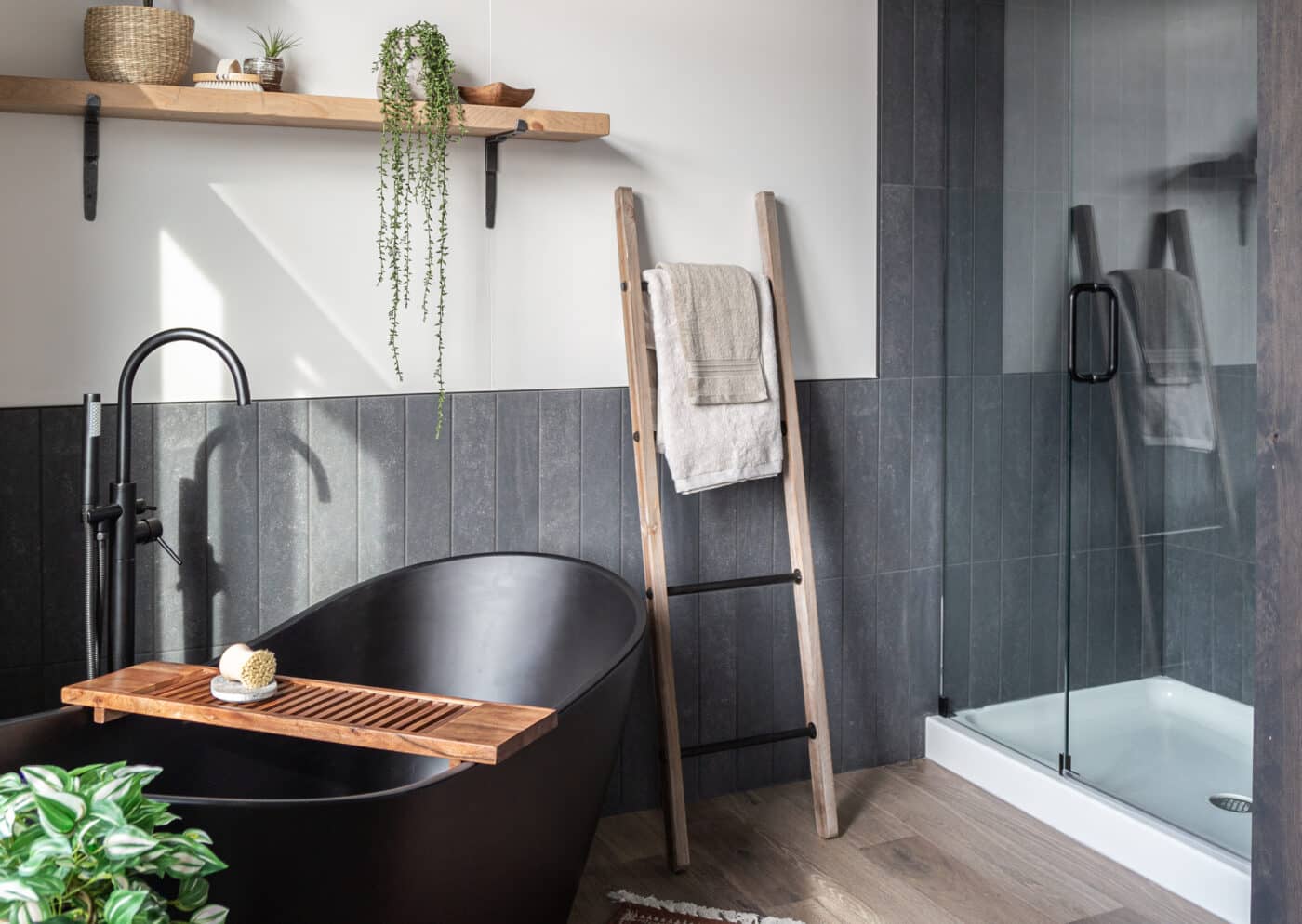
What Size Must A House Be To Qualify As A Tiny Home?
According to the International Residential Code (IRC) Appendix Q, adopted by New Jersey for tiny homes, the maximum floor area is 400 square feet, excluding lofts. Habitable spaces must have a ceiling height of at least 6 feet 8 inches, while bathrooms, toilet rooms, and kitchens require a minimum ceiling height of 6 feet 4 inches. Each habitable room must be at least 70 square feet, and loft areas must have a minimum floor area of 35 square feet with a ceiling height of 3 feet.
How Much Does It Cost To Build A Tiny House In NJ?
The typical cost for a tiny house in New Jersey ranges from $30,000 to $60,000. For more luxurious and high-end homes, prices can increase to between $90,000 and $100,000.
Are Park Model Tiny Homes A Good Investment?
Yes, Park model tiny homes can be a good investment for several reasons.
- They offer a lower initial cost compared to traditional homes, making them an affordable entry point into the housing market.
- Their compact size results in lower maintenance and utility costs, contributing to long-term savings.
- Park model tiny homes appeal to a growing demographic interested in minimalist, eco-friendly living, which can enhance their resale value.
- They can also be used as vacation rentals or second homes, generating rental income and providing a flexible investment option.
Bobby Lee and Andrew from Texas decided to create an authentic Texan experience with short-term rental units. They partnered with Zook Cabins to customize 11 log cabin park model homes, successfully launching the Big Texan RV Ranch in under six months.
Read on to learn how their investment turned into a success story.
Where Can I Buy A Park Model Tiny House In NJ
Zook Cabins is a well-known builder of high-quality, customizable park model tiny homes based in Atglen, Pennsylvania. They have gained a reputation for their craftsmanship and attention to detail.
- The Alpine: A compact yet spacious model featuring a loft area, full kitchen, bathroom, and a cozy living space.
- The Nook Family: Designed with campground owners in mind, the Nook Family Park Model is the perfect retreat for families seeking comfort and adventure in nature.
- The Rockwood: Built to meet and surpass ANSI 119.5 Standards, this home also carries an RVIA Seal, a testament to its quality and craftsmanship.
- The Aspen: The Aspen Log Cabin is a log stack style park model home loaded with features that can create a truly special experience.
Explore other Zook Cabins park models
What Is The Process Of Building a Park Model?
- Consultation: Zook Cabins starts with a consultation to understand your needs and preferences. They provide guidance on design options and features.
- Design and Customization: You can customize the floor plan, materials, and finishes. Their team works with you to ensure the design meets your expectations.
- Construction: The cabins are built in their controlled environment, ensuring quality and consistency throughout the build process.
- Delivery and Setup: Once completed, the cabin is delivered to your location and set up by a professional team, ensuring everything is in place and functioning correctly.
Is Living In A Tiny House Comfortable And Practical?
Living in a tiny house can be both comfortable and practical for many people. These homes are designed to maximize space efficiency, often featuring multi-functional furniture and clever storage solutions. The reduced size can simplify maintenance and lower utility costs, making them an economical choice.
What Are Utility Bills Like In A Tiny House?
Utility bills in a tiny house are much lower than in a traditional home. The smaller size requires less energy for heating and cooling, reducing electricity and gas bills. Water usage is also lower, decreasing water and sewer costs. Many tiny homes use energy-efficient appliances, further cutting expenses. Overall, tiny houses are an economical choice for utility bills.
what do other States have to say about tiny living?
Each state has a little bit of variance in how they address the idea of tiny living. On the table below,w we have a guide for each state that we deliver to. Finally, the difficulty of trying to find the information you need is over!
